- Home
- Lise McClendon
All Your Pretty Dreams Page 2
All Your Pretty Dreams Read online
Page 2
The old man sat by a picture window that overlooked a stretch of lawn. Claude Bayard waved him in. The room was bright and warm, very different from his grandfather’s in the nursing wing. Pictures on the walls, a fluffy red comforter on the bed, real tea cups, a worn oriental rug over the industrial carpet. The armchair he sat in looked comfortable and well-used.
“I would get up, monsieur, but the legs don’t work so well,” he said, motioning Jonny into a straight-back chair. “Ah, you bring your instrument. Bon.”
Jonny shook the dry fingers of the man’s gnarled hand. Wendy was right, he was ancient, withered below the waist but with a fascinating, deeply-lined face, large nose, and alert blue eyes below the white-as-snow thatch and shrub-like gray eyebrows. Before Jonny could wonder if this was all a giant waste of time, the old man began ordering him to do things. Put on the accordion, close the door, show me your finger work, play some chords, what do you know, we must check the felts for the moths, stand up and play, give it some power now. He was a bossy old fart with a French accent but he obviously knew what he was doing. The hour went quickly.
The old man pushed back his hair, looking tired. “You come back tomorrow then? With knowing the bass chords?”
Jonny unstrapped the accordion, heavy old beast. Still pearly but scratched and a bit tired, it had been his grandfather’s. Reinholt had bought it just after World War II. Jonny got it officially when he was twelve and his grandfather retired from the band. Reinholt had been teaching him to play since he was six.
“I used to know all those chords,” Jonny admitted. “I’m pretty rusty.”
“When I was your age I learned three new songs every night. And played them the next day with the band.” Claude fixed him with his stare. “You like this band?”
Jonny nodded. “It’s the family— my father and my sister.”
“Just three?”
“There’s been others but— “
Before Ozzie’s children went into forced service, there had been Al and Toby and Victor. Some lasted a year, some a month. Ozzie wasn’t the easiest man to get along with, especially when it came to his band.
“He is strict, your father?”
“He loves his band. It’s his life.”
The old man put his gnarled fist to his chest. “Music comes from deep inside. It erupts like a love affair. From deep in the heart.” Jonny wilted under the old man’s gaze. “You love the music?”
“Yes, I— I love music.”
But this music? Could he learn to love polka after all these years? It would make this summer so much easier if he could. He promised himself he would try to let polka erupt in his heart. A bruised, sad place, this heart of his. An eruption might be the end of it.
The sun was out when he stepped out the front door of the rest home. The humidity had spiked. The cloak of moisture enveloped him. He was sitting behind the wheel in his Fairlane before he remembered his grandfather.
Jonny looked at the sky, the clouds breaking to display the bluest of blues. The sun warmed his shoulders where the straps had dug in. He couldn’t make himself go back inside. He stretched out his fingers over the steering wheel.
Tomorrow.
Chapter 2
If there had been a choice she wouldn’t have called 9-1-1.
As it was she already had a nodding acquaintance with the local cops, thanks to shenanigans by Alison and Kim, drunk and underage and loud, all on their first night in Red Vine. She knew the cops would take care of it, the horrible racket that was keeping her from sleeping. She could hear it over the rattle of the air conditioner. She would have moved to other end of the motel but this room was hers, the only one with working a.c. She’d smelled the other rooms. Damp was the best you could say.
She pulled on her beanie. Officer Lars had come alone, without Officer Ole. Before it took both of them to drag the girls out of their squad car. Who knew what the officers’ names really were; they just looked a Lars and an Ole.
“Ma’am.” He took off his hat. His hair, short and blond, was creased but neat.
“Officer.” Lars had a moony look on his face so she got straight to business. “Can you hear that?”
He turned toward the garage. “The music?”
“Is that what you call it? Well, it’s midnight and I need some sleep.”
He scooted off toward the screeching. She watched him skip away, so eager to help. Christ. She might as well check to see if the brood was tucked in.
The moon was bright in the east, nearly full. Good news because most of the lights over the doors were burnt out. The two male students roomed next door. Andrew opened the door, his glasses crooked on his nose.
“You get the wireless router?”
“Not yet.” His laptop was open on the bed. “Is Terry here?”
“He went to the library, where they have the Internet, something you may have heard of?” He smirked meanly. Andrew needed to work on his social skills. He cocked his head. “What the hell is that?”
“They call it music around here.”
In the next room the quiet girls, Lydia and Kate, snuggled under the covers, reading. Isabel told them ‘good night ladies’ and instantly felt seventy years old. How did she get herself into this? She was a scientist— or would be when she finished her degree—not a baby-sitter. The racket in the garage stopped, mid-cacophony.
“Thank God.” She savored the quiet for ten seconds. Then crickets seized the opportunity.
Officer Lars was talking in his slow drawl as he appeared around the corner of the garage. He gestured toward Isabel and spoke to the man beside him, presumably the culprit. Shorter than Lars, wiry compared to the policeman’s bulk, he wore dark jeans and a white t-shirt. His face looked ghostly pale in the moonlight.
He raised a hand in a sort of papal dispensation and called across the drive: “Sorry. I didn’t know it was so loud.”
“Right,” Isabel whispered and waved them away. She continued on to the next room. Alison and Kim had roomed here together at first. Now, post-hijinks, they were split up so they could spread rebellion among the ranks. Alison opened the door in a red bikini top and low-slung pajama bottoms, her blonde hair piled on her head.
“Checking up on me, Izzie?” She struck a pose when she saw Lars and the other man, a hand on her tanned hip. “Evening, guys.”
“Give it a rest, Alison. We go to the blueberry fields tomorrow. It’ll be a long day.”
“Six-thirty?” Maddie Elliot was painting her toenails. “Are you serious?”
Officer Lars drove back to his doughnuts. Isabel continued down the row, the tyrant field director and the wayward youths. There were ten of them, plus the driver, and it took every ounce of patience to deal with them. She hated the way she sounded, so authoritarian, so much the fun-killer. So like her mother. But that was what Professor Mendel was paying her for, and if there was one person Isabel would not let down it was the professor.
She walked back through the parking lot to her door. A figure jumped out of the shadows. “Shit!” Her hand flew to her throat. “What the hell are you doing?”
“Sorry. I just wanted to apologize for the— the noise.” He stuck out his hand. “Jonathon Knobel. I was up on the roof this morning.”
“Ah. The raccoon.”
Up close she got a better look at him. His hair, messy and hanging over his forehead, was a dark auburn color most girls would die for. Taller than he looked earlier, with quirky eyebrows and soulful gray eyes, he had a black smudge across his white shirt from shoulder to shoulder. He dropped his hand and was staring at her braids (or her tits, hard to tell.)
“I just arrived. Home— here. I’m practicing for the family band. The Notable Knobels. The accordion, as you heard. Polka mass in three days. My dad is on my ass.”
“You play so— notably. But some of us have to sleep.” Did all Minnesotans assume you care about their lives?
She gave him a last look— he was wearing cool shoes, high-top leather sneakers—
then let herself into her room, chilly from running the air conditioner full blast. She flipped the dial and it ticked slowly into oblivion.
She’d heard enough out of the accordion in Europe to last a lifetime. The post-football-match all-night annoyance of choice. Through the thin walls his footsteps faded away, back toward the garage then a few minutes later toward the house.
Ozzie’s son. Poor him. How old was he, she wondered, then stopped herself. He was just a guy who lived somewhere slightly more hip than Red Vine, Minnesota. Imagine that.
Isabel threw her hat on the bed. At least she didn’t have to room with one of the students. They seemed so vacant, so unfocussed. For biology majors especially, although she had doubts about that. Alison for one could no more be a biology major than, say, Wendy Knobel, last seen tearing around town in a blue convertible, wearing a halter top and short-shorts, clinging to the neck of some yokel.
Wendy made Isabel think of her own sister. She hadn’t heard from Daria, who was four years older and lived in Chicago, or their parents in Winnetka, since she’d returned from Spain. Nor had she called them. She loved her sister but her parents were rich and bossy as only rich people who think they know better than anybody else can be. Yet she did love them too. The fact that they had forgiven her for the legal emancipation was to their credit. They would be mad at her for not keeping in touch this year. She’d hardly written a postcard in twelve months.
Stalking to the bathroom, she stared at her hair in the etched mirror over the sink. Ugly business. Why didn’t hair grow faster? Four months had passed since the au fait decision to dye it black. Two inches of blonde roots made her look like a skunk. Another week of hats and she was going to take the plunge and cut off all the black. She pulled the elastics out of her braids and rubbed her scalp. What had she been thinking, pretending to be a Spaniard?
Things are at a pretty poor impasse when you dye your hair to keep your boyfriend. For weeks in Barcelona she had watched the Catalan girls with their flouncy skirts throw themselves at Luis. How could she compete with their casual seductiveness, tanned legs, and flashing dark eyes? Beside them she looked like a seashell left in the sun too long. She wasn’t going to buy some silly ruffled skirt. She had an allergy to ruffles, and wore skirts only when it was so hot wearing slacks was suicidal.
She could still feel Luis, his warm skin, the taste of his mouth. His brooding eyes and full lips. From the first moment she saw him, singing in that bar in Montpellier, she had wanted him. She loved musicians, their sensitive spirit, their dedication, their passion.
How desperate she’d been.
She climbed into bed and tried not to think about Luis or Winnetka. Thinking of calling her parents made her shudder. She knew what would happen, how she would lose control of her life. It was better this way, for all of them, she told herself, sighing into the pillow.
Thoughts of Luis led as always to Alec. Her first boyfriend. The reason she ran away to Spain. How could she have been so wrong about him? His parents were plain, hardworking people, salt of the earth. Alec was the bright spot in their lives, and Isabel’s too. Her college career could be summed up as stubborn ambition, numbing all-nighters, and grinding low-wage jobs. It was the way she wanted it. Nobody would get credit for her success but herself. She thought Alec was the same. They were united in their passion for the independent spirit, pure science, the lush bounty of the earth’s creatures, advancing knowledge to save the world from the ravages of humanity.
She who thought of herself as tough and independent. Alec had made her feel less of a person and she could never forgive him for that. How could she face him after the betrayal? Isabel finally looked at the trust account her parents had set up without her permission years before. She took out enough for a plane ticket to Paris and a Eurail Pass, filled her backpack, and was gone.
She pulled the limp sheet up to her chin. As if Alec’s presence or lack thereof made one bit of difference in her life. Away, bad thoughts. Away, bad Alec. She was home, thanks to Professor Mendel. Lillian Mendel was the best: smart, savvy, organized, caring, witty. She had reached out to Isabel, arranged this field gig. It wasn’t going to rock the world, counting wild bees in the field. But it got her home, gave her a reason to get back to her love of science, and bees. She would be back in school in September under the protective eye of her mentor. With notes for her dissertation and with any luck less than a hundred bee stings.
At six-fifteen she stood with damp hair next to the Econoline van. It was dirty with mud spatters, and locked. Curtis hadn’t rolled out yet. He didn’t like to sit around and wait for the prima donnas any more than she did. The sun slanted through the high branches. Birds chattered in the maples. The quiet was soothing. The morning was already warm, moisture oozing from the earth around Margaret’s rose garden.
And Margaret herself, noodling around in her gloves and hat, clipping this, spraying that. These gardeners and their chemicals were killing bees. We had to stop spraying our way into sterility and starvation. People just didn’t understand about bees, how they helped everything, including rose pollination. A talk with Margaret was in order.
“Good morning, Mrs. Knobel,” she called.
Margaret stuck her head up, eyes wide. She wore a blue print wrap-around housedress and a wide-brimmed hat.
“My name is Isabel Yancey. Nice to meet you.” Nothing like manners to set things right with the older set. Margaret pulled off one glove, shaking hands. “I was admiring your roses.”
“Oh, thank you. I do so love them.” Margaret sighed, her cheeks pink, scanning her pets.
“I can see that. Up so early.”
“It’s the best time to spray, just after dawn. The plants seem to be so receptive at this hour. So open and fresh.”
“I’m sure. Did you know I’m a graduate student?” Isabel waved her helmet and veil. “Entomology. Insects. Bugs.”
“Oh. Ozzie told me. Very interesting.” She looked like she’d been hit by a stun gun.
Isabel cupped a perfect pink rose in her hand. The chemical odor of pesticide hung unpleasantly in the air, stinging her nose. “You belong to a garden club?”
“Strictly roses. Lots of rose people hereabouts. We’re having a big party in a few weeks. Right here in the garden, that’s why I have to get things just so. The Rose Rave, we call it. The band will be— Oh! You students should come.”
“Sounds like fun. Are you looking for speakers for your rose club? Because I have a thing I do about insect life. In the garden, pollination and all that jazz.”
“Really. That sounds right up our alley. There’s a meeting in three days. Monday evening, here at the house. Usually we just compare notes, who has fungus, where the aphids are bad. Some Rave details but—”
Curtis blared the horn. The crew of Bee Wild-ers was slumped against the van, bleary-eyed. Somebody moaned, “Cofffeeee.” Isabel turned back to Margaret.
“Monday? What time?”
Chapter 3
The door stood open. Jonny felt a surge of embarrassment for his grandfather, his entire miserable existence exposed to passersby. Maybe he was past caring, flat on his back in an old red flannel robe. His toes stuck up under a white blanket. His face was slack, a spot of spit on the corner of his mouth.
Worse than last time, his mother had warned him. Unpredictable, sad, angry, depressed: a roller coaster ride. Ozzie rarely mentioned his father these days. It was too hard to talk about, the shell of a man so admired, full of jokes and mischief and music. Elks Lodge president, apple cooperative founder, first lieutenant in Korea, accordion player, parish deacon— now this. Still robust in body, his barrel chest rising and falling with each breath, making a mockery of the mind.
Jonny shifted the accordion on his back. Half an hour until Claude was back from breakfast. He stepped into the room, his shoes squeaking on the linoleum as he took off his instrument, sat down, and set it on his lap. In the sterile quiet the question from his mother last night rang in his head. “So you
and Cuppie—? You think you’ll patch it up?”
Margaret had sat on the edge of his bed, eyebrows raised in hope. He had explained it all to her. She would never give up.
“I haven’t heard from her in weeks.” He stood at the window of his room, looking down on the Rainy Days Motor Inn. Two college girls were throwing a Frisbee in the parking lot.
“Maybe you should call her. She might be waiting for you to say you’re sorry—”
“I’m not sorry.”
She fiddled with the hem of her apron. “You seemed so perfect for each other.”
“Maybe once.” He turned to her. “We met when we were sixteen. I’m a different person now.”
“But so is she.”
The truth was Cuppie hadn’t changed at all. In March she announced her plan to go to Branson, Missouri, as usual over spring break. She always went to a clogging competition, and never asked him to come along because it was no secret he hated clogging. She’d been at it since she could walk. Why had he thought she’d give it up in the city? Because he gave up the accordion?
He still didn’t know how he finally got up the nerve to tell Cuppie the truth. His voice shook a little. Was he going to hurt her? Was he nuts— throwing out everything he knew, this marriage, this comfortable life? He told her he wouldn’t be there when she got back. She stared at him with glazed eyes, a dull smile, an expression of bored inattention. He’d seen it before. She wasn’t listening. She didn’t believe him. She was like a child who believed if she said the right things, her faults would be overlooked. If she smiled and ignored what he was saying, dismissed the raw truth he was revealing, she would get that lollipop, that pat on the head. Maybe once those qualities hadn’t mattered. But that genie had flown.

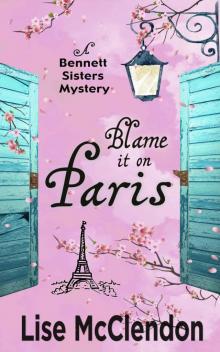 Blame it on Paris (Bennett Sisters Mysteries Book 7)
Blame it on Paris (Bennett Sisters Mysteries Book 7)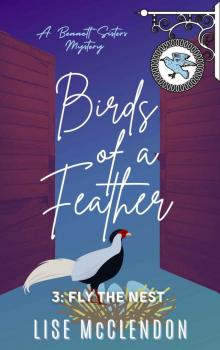 Birds of a Feather: 3: Fly the Nest (Bennett Sisters Mysteries Book 16)
Birds of a Feather: 3: Fly the Nest (Bennett Sisters Mysteries Book 16)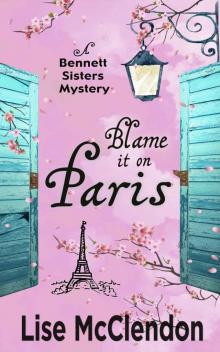 Blame it on Paris
Blame it on Paris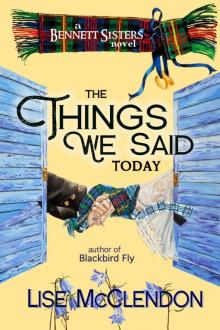 The Things We Said Today
The Things We Said Today Bennett Sisters Mysteries Volume 5 & 6
Bennett Sisters Mysteries Volume 5 & 6 Bennett Sisters Mysteries Box Set 2
Bennett Sisters Mysteries Box Set 2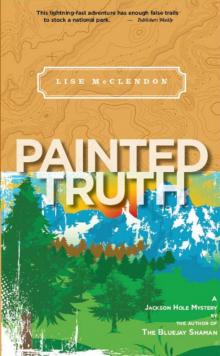 Painted Truth
Painted Truth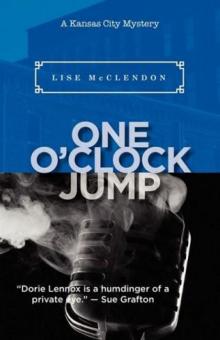 One O'Clock Jump
One O'Clock Jump The Bluejay Shaman (Alix Thorssen Mystery Series)
The Bluejay Shaman (Alix Thorssen Mystery Series) Swing Town Mysteries Dorie Lennox Box Set
Swing Town Mysteries Dorie Lennox Box Set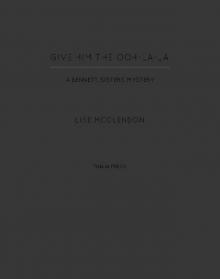 Give Him the Ooh-la-la
Give Him the Ooh-la-la Blackbird Fly
Blackbird Fly All Your Pretty Dreams
All Your Pretty Dreams Nordic Nights (The Alix Thorssen Mysteries)
Nordic Nights (The Alix Thorssen Mysteries)